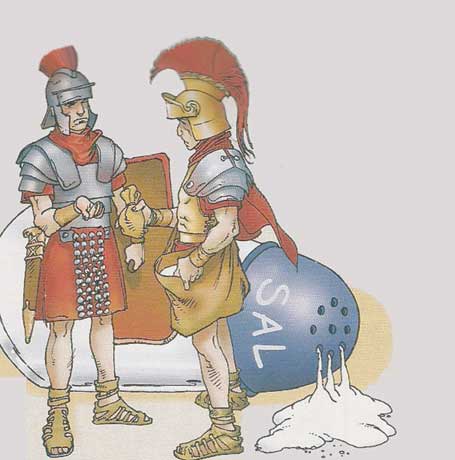Salary
The word we are going to discuss today is the main motivator behind you all getting out of your beds in the morning to go to work: salary. I know it hurts even to talk about it, but don’t worry since we are only going to have a look at the historical and linguistic aspects of the word, not numeric.
If you have been working for a while, you must at some point in time have thought a month to be a too long a time for getting paid for your work. But, trust me, things were worse in the past. Different governments around the world used to have different rules for paying their employees, but let us just talk about Ancient Rome right now, primarily because the word ‘salary’ has Latin roots. During the Roman Republic, Roman soldiers were paid an amount known as stipendium, but they had to wait for a whole year to get it. You guessed it; the English word ‘stipend’ comes from the same Latin term. After the Augustus Reforms (30 BC - 2 BC), the Roman soldiers began receiving stipendium every four months. That was, by the way, also the time when the Roman Republic ended and the Roman Empire began. The word stipendium is the combination of the Latin words stips meaning small payment or gift, and pendere meaning weight. The word pendere is also responsible for the English words ‘pendent’ and ‘pendulum’.
However, the stipendium only began after the Siege of Veii in 406 BC. Before that, the Roman soldiers were paid salarium. While there is a disagreement among scholars about the mode of payment (there weren’t any credit cards back then, by the way), they all agree that the word salarium comes from the Latin word for salt: sal. Since salt used to be a precious commodity back then, according to a theory, the soldiers were paid in salt! Imagine heroically winning the Latin War for your Republic, only to be awarded in salt and that too after a year. Yes, that would have been a disappointment today, but in those times, salt was a luxury. Still not convinced? Let’s thank God we’re born in this century. But you still have got to be ‘worth your salt’ to get the ‘salary’ at the end of each month!
Other experts believe that salarium was not paid in the form of salt, but was merely a bonus in form of Denarius (Roman and later Byzantine currency from which early Islamic coin dinar originated, and continues to be the name of a number of Islamic currencies today) paid to those soldiers only who captured salt supplies or guarded salt routes. The proponents of this theory claim that roads were specially built to the capital Rome in order to transport salt, (for example Via Salaria - literally: the salt road - that connected Rome to Adriatic Sea) and their protection from looters was of utmost priority to the Roman government.
Interestingly, in all Romance languages (languages that were directly evolved from Latin) the word for ‘salt’ is still a variant of sal, the original Latin word. French: sel, Spanish: sal, Portugese: sal, Italian: sale. And this also reminds me of the English word ‘saline’. So if up till now you too thought that ‘salary’ is more prestigious than ‘stipend’ then millions of Ancient Roman soldiers beg to differ.